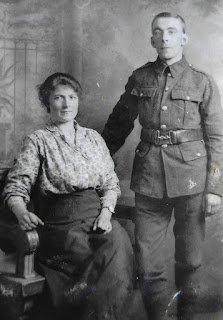Billets at Arzignano
According to the Brigade War Diary, “Units of the Brigade carried out training during the mornings from 9am until 12 noon and the afternoons were devoted to recreational training. Educational classes were held each morning and units in turn had the use of Range W”. Pte. Harold Charnock (see 6th January) recalled that, at some point in February, “The Battalion team, under Lt. Thomson MC (2Lt. Wilfred Frederick John Thomson MC, see 23rd January), won the Brigade football cup”; the date and details are unknown, but it is known that Pte. Herbert Stott (see 17th August 1918) was a member of the successful team.
 |
Commemorative medal awarded to Pte. Herbert Stott
Images by kind permission of Barry Gartside
|
2Lts. Cyril Edward
Agar (see 7th December
1918), William Johnson Simpson MC (see above), George Clifford Sugden MC (see
1st January), Edward Kent
Waite MC (see 1st January)
and Mark Allan Stanley Wood MC (see 2nd December 1918) were
all promoted Lieutenant
Pte. John Gayton
(see 28th January) was
posted to England to be demobilized; he would be demobilized from the dispersal
unit at Purfleet.
2Lt. Thomas Walsh
(see 31st December 1918)
formally relinquished his commission on grounds of ill health; he gave his
address as 7 Brook Street, Clitheroe.
Sgt. George Richard
Goodchild (see 6th January)
and Ptes. John Thomas Damant (see 2nd January), Robert Page (see 8th September 1917) and Kingsley James Reeve (see 2nd
January) were all formally transferred to the Army Reserve Class Z.
Sgt. Thomas Bulcock
(see 3rd January), who had
been serving with 2DWR, was also formally transferred to the Army Reserve Class
Z.
A/Sgt. Harry Brown,
serving with the Royal Engineers, was also formally transferred to the Army
Reserve Class Z. He had been an original member of 10DWR before (date and
details unknown) being transferred to the Royal Engineers. In the absence of a
surviving service record I am unable to make a positive identification of this
man or to establish any details of his service.
Pte. Harold Parsons (see 18th
June 1918), who had been in England since June 1918 after suffering from
psoriasis, was formally discharged from the Army as no longer physically fit
for service due to his illness; he was awarded a pension of 5s. 6d. per week,
to be reviewed after one year.
Clara Tempest, widow of the late Pte. Arthur Tempest (see 29th
April 1918), who had been
killed in action on 20th September 1917, married John Petty
in Bradford.


No comments:
Post a Comment